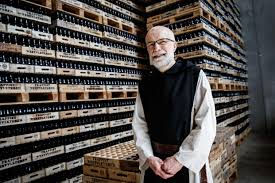Flavour
- fintanohiggins
- Apr 10, 2023
- 2 min read

I have a great deal of respect for William Porter. His books and podcast appearances have helped me a lot, and perhaps most usefully of all, given me a simple but convincing narrative about how addiction works.
There are two things I find frustrating about his approach, however. The first is his idea that all you need to free yourself from booze forever is the absolute certainty that you will not drink. I may be oversimplifying what he says but I don't think I'm misrepresenting it. I've heard him say several times that he simply knows he will never drink again.
That's great, and I have no reason to doubt him, but for many of us, particularly those of us who have had multiple relapses, it's not that helpful.
The other problem I have, and it is not unrelated to the first I think, is that William Porter has a tendency to be quite literal-minded. I'm pretty sure he's said so himself. As a soldier and a lawyer, you probably need to have a good sense of words meaning what they pretend to.
One of the things that Porter is certain of is that alcohol tastes disgusting, and that all we need to do is to wake up to the fact that most drinks are just a way of covering up the horrible taste.
Alcohol is a nasty chemical, it's true. If you take a nip of spirits after not having had a drink for a long time, you are in no doubt that you are drinking the same stuff that they use in hand gel. Take a sip of wine and all you can taste is the industrial flavour of ethanol. And it's also true that many delicious alcoholic drinks have been developed to disguise, or at least to soften the harsh taste of the chemical.
However, I want to say something briefly about taste and flavour, and culture. There is such a thing as an acquired taste. Children mostly dislike: olives, blue cheese, liver, oysters. Adults who have learned to like these things have gained something, and have access to a new pleasure.

The flavour of alcoholic drinks is something that has been cultivated and refined over thousands of years. Yes, the fundamental purpose may be to cover up the posionous addictive chemical, but you could say that religious art is just a way to make more palatable the insane lies and patriarchal oppression of organised religion. (If you were a student, and if it was late at night, and you were a bit stoned, you could really say that; I mean, you might go on about that quite a lot.) It doesn't mean that works of religious art are without real artistic or spiritual value.
Some moving religious art

None of this is to say that the experience of tasting the rich variety of beers, wines, and spirits is worth it. It is, for me at least, definitely not worth it. But it is to acknowledge that in giving up booze you are denying yourself something more than the treacherous dopamine rush (or whatever; I'm not an endocrinologist) that is the relief and only pleasure of the addict.
Some delicious religious beer
And if it's important to the process of recovery to be truthful, it is probably better to acknowledge that.












Comments